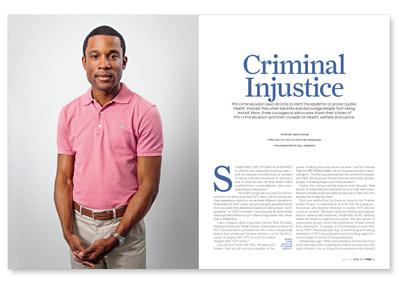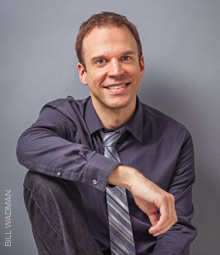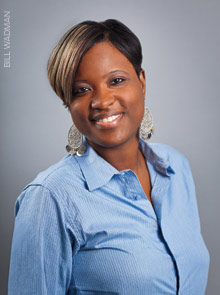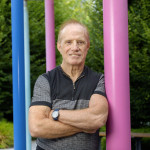
Sometimes HIV stigma is manifest in obvious and laughably insulting ways—such as someone recoiling from an embrace or taking ridiculous measures to sanitize a dish or towel we used. At other times it takes a subtler form—a prejudgment, often masquerading as compassion.
But when people are accused of or prosecuted for not disclosing their HIV status before having sex, they experience stigma in an entirely different dimension. They may find their names and photographs plastered across the local news with hysterical headlines calling them “AIDS predators” or “AIDS monsters,” accompanied by news stories claiming they infected or put others at significant risk, when that is utterly false.
I can’t imagine what it has been like for Nick Rhoades, Monique Moree and Robert Suttle—three brave survivors of HIV criminalization prosecutions who have courageously shared their stories and become activists—or for the thousands of people with HIV around the world charged with “HIV crimes.”
I am proud to work with Nick, Monique and Robert; they are all moving examples of the power of telling the truths about our lives. Last fall I filmed them for HIV Is Not a Crime, a short documentary about criminalization. The film has personalized the issue for thousands, and Nick, Monique and Robert have become public spokespeople, combating stigma and criminalization.
Rather than being publicly shamed and ridiculed, they should be celebrated and admired for how they have transformed a cruelly unjust and difficult episode in their lives into service that is helping others.
Nick now works from his home in Iowa for the Center for HIV Law and Policy. One of their initiatives is the Positive Justice Project, a coalition of more than 100 individuals and organizations working to repeal HIV-specific criminal statutes. Monique opened a testing and support drop-in center in her hometown, Holly Hills, South Carolina, where her father is a well-known pastor. She also speaks to community groups about her experience. Robert moved from Shreveport, Louisiana, to the Northeast to work with me at SERO (theseroproject.org), documenting and raising awareness of HIV criminalization and providing support to those charged or at risk of being prosecuted.
Several years ago, when criminalization became the focus of my advocacy work, many people viewed the issue as a civil rights violation, one on a long list of injustices in the criminal justice system. It is that, for sure. But it is also a serious public health concern, as the best defense against prosecution is ignorance of one’s HIV status. Criminalization discourages HIV testing, punishing those who know their status, conveying the chilling message, “Take the test and risk arrest.”
Criminalization is inherently discriminatory; the approximately 35 states with HIV-specific statutes don’t have statutes addressing hepatitis, HPV or other sexually transmitted pathogens that, if left untreated, can kill people. That’s because those viruses aren’t associated with outlaw sexualities, gay men, anal intercourse, people of color or people who use drugs.
The public’s appetite for beating up people with HIV remains enormous, even among communities thought to be educated about HIV/AIDS. Researchers at the University of Minnesota found that 63 percent of gay men (including up to 79 percent of very young gay men) and even 38 percent of HIV-positive gay men support HIV-specific criminal laws.
When people examine the issue more closely, those numbers change. Almost everyone will agree that sentencing in many of these cases is vastly disproportionate to any actual or potential harm. Most people will understand why HIV-specific criminal statutes—literally creating a different set of laws for people with HIV—are wrong, just as creating different laws for people based on their skin color, gender or sexual orientation is wrong. The tough question concerns the appropriate role, if any, for criminal law in the context of harmful sexually transmitted pathogens. Such laws should focus on the intent to harm, the actual risk created, if any, and the actual damage inflicted—if any.
I am optimistic that we will ultimately win this battle. But it will be a long and difficult struggle, and it may well get worse before it gets better. Last year, Nebraska made it a felony for people with HIV to sneeze or vomit in the direction of a law enforcement officer; legislators in Maryland recently tried to increase their nondisclosure penalty from three to 25 years. Fortunately, there are also signs of hope, including growing advocacy at a local level: People with HIV and their allies in Iowa recently had a bill introduced in their legislature to dramatically improve that state’s draconian statute.
But the most promising signs of hope are found in people like Nick, Monique and Robert, who are, in the best of the self-empowerment tradition, fighting back. I salute them, and I think you will too, when you read their accounts of experiencing HIV criminalization. Their voices will stay with you and, I hope, inspire you to join the battle for justice for people living with HIV.
Sean Strub is executive director of SERO (theseroproject.org). He cofounded the Positive Justice Project and is the founder of and advisory editor of POZ magazine. He has had HIV for more than 30 years.
***
 Robert Suttle, 33,
Milford, Pennsylvania
Robert Suttle, 33,
Milford, Pennsylvania After a brief and contentious relationship ended, Robert Suttle’s former partner reported him to the police, causing Suttle to be charged under Louisiana’s “Intentional Exposure to AIDS Virus” criminal statute. Little was done to investigate the charges, and Suttle was never accused of transmitting HIV. After serving six months in prison, Suttle emerged with a newfound purpose and goal: to abolish HIV criminalization laws in the United States and around the globe.
There it was on the kitchen counter: a search warrant. I came home from work one day in late summer 2008, juggling bags, keys and phone—and spotted it. Someone had been in my apartment. They had gone through my things, opened drawers and closets, rifled through documents and prescription bottles. They were looking for anything related to HIV.
It began on New Year’s Eve 2007, when I met someone through a mutual friend. We had a casual relationship. It was short and contentious. When I stopped seeing him, he kept threatening to press charges for not having initially disclosed my HIV status, and that’s exactly what he did.
Months later, there was that search warrant. Then in August, the police arrested me at work. Everything hit the fan. I wasn’t out about my sexuality and had not disclosed my HIV status to my family. Everything was private—my diagnosis, my relationships. But now, everyone knew I had HIV, and people drew their own conclusions about my sexuality.
Since my diagnosis, I had learned about HIV and how to live day to day. I didn’t feel I needed to justify anything to anyone. But I was vulnerable. Now [with my arrest], things I’d kept private were made known. I was exposed.
I spent the next two years in and out of court until I was sentenced in June 2010: ordered to serve six months in prison, and given a 15-year sex offender status. Underneath the photograph on my Louisiana driver’s license, in big red capital letters, it says “SEX OFFENDER.” I never thought this would happen to me. I’d gone to school, earned a degree, tried to make something good out of myself. Now all that was over, and it was devastating. I didn’t know what this would lead to, but I knew what a conviction meant in the state of Louisiana, in the South. Along with being black, being gay and being HIV positive, I would now be a convicted felon and a registered sex offender.
While in jail, I thought about my life, because I knew I needed a new plan. The day after my release, I went online and started researching and finally found a name for what I was experiencing: criminalization. I found Sean Strub’s phone number on something he had written about fighting HIV criminalization and called it within 48 hours of my release from prison. I told Sean I wanted to help, that this was what I was prepared to devote my life to—abolishing HIV criminalization laws.
Since then I’ve traveled to Geneva and Oslo speaking to UNAIDS about my story. I’ve joined the Positive Justice Project and the HIV Justice Network. I’ve moved to Pennsylvania to work with Sean Strub launching SERO, a nonprofit initiative combating HIV criminalization, stigma and discrimination and promoting the empowerment of people with HIV.
The courts and the lawyers do not understand HIV or the science of transmission. HIV is not a crime. Criminalization laws are not prevention. In Louisiana, they’re just another way to lock up young black men.
Today, I stand as a voice for people who will not or cannot speak for themselves. I am speaking for all people who don’t have the strength.
 Nick Rhoades, 37,
Waverly, Iowa
Nick Rhoades, 37,
Waverly, IowaNick Rhoades is HIV positive. He had sex. He had an undetectable viral load. He used a condom. For this, he learned, he could be going to jail for a very long time. After the one-time partner pressed charges, Rhoades received the maximum sentence: 25 years in prison and lifetime sex offender status. Letters from advocates got the judge to reconsider the sentence. Rhoades was released after about a year, but he still has sex offender registration requirements that are nothing short of medieval in their cruelty, and his life has been forever changed.
In 2007, I was working at a video store, taking time out to get my life together. I had just moved back home, close to my family. I was finding the right kind of support and the right kind of HIV treatment. For the first time ever, I was starting to feel hopeful about my future. And then three armed police detectives approached me at my place of business and asked me to accompany them to the police station.
I had had a one-time encounter with a guy I had met online. A week or so later, a warrant had been issued to arrest me for “criminal transmission of HIV.” The fact that transmission of HIV did not actually occur didn’t matter. I was looking at a Class B felony, with a 25-year prison sentence. I was 33 years old.
As I sat in the police interrogation room revealing personal, invasive details, I didn’t think I could survive what I knew would be a hellish experience. I was scared. It was the last straw. I lost my desire to live.
The headline in the local newspaper read, “[Local] Man Arrested for Transmitting HIV.” For close to a year, my life consisted of a seven-week stay at an acute psychiatric care facility and nine months in a maximum-security county jail (six weeks in solitary confinement). I never saw a clock; I never looked out a window.
Finally, I had my day in court. My attorney advised me to plead guilty, and we hoped for a plea bargain from the prosecutor. I entered my plea and was sentenced then and there. The court had conducted a presentencing investigation just one day earlier, and the results were reviewed with me in a small office near the courtroom, five minutes before I went back into court in my shackles, handcuffs and orange jumpsuit.
Sentencing was swift. The judge pronounced me guilty and sentenced me to the maximum, 25 years in prison, with lifetime sex offender registration.
I’m HIV positive. I had sex. I used a condom. No transmission of HIV occurred. My viral load was undetectable. This man—my accuser—chose to have sex with me, and we had safe sex.
But none of this mattered.
Later I was sent back to court. Multiple letters on my behalf, from advocates all over the world, as well as family and friends, had been sent to the judge, and my sentence was reconsidered. I was released. That night was the first time in months that I slept in serene darkness—no cameras, no guards—in a place I called home. It felt unreal.
I was considered likely to re-offend, and I was classified in the highest risk category. This requires me to register with authorities every three months. I cannot be around minors, even family members, without their parents’ supervision. All my computers, text and phone records—and those of anyone living in my home—can be confiscated at any time. I am not allowed to have casual sex, watch pornography or use social networking sites. I may not leave my county without permission or the state without a travel permit. I have a midnight curfew. I may not have liquor in my home or visit a bar. I must take an invasive polygraph test every six months and visit my probation officer every two weeks. I was even threatened with “phallometric testing,” which I think involves attaching some device to my penis to measure my sexual response to different stimuli.
My life is forever marked by one night. One night and one outdated law.
But my life is now full of advocacy and volunteer work. I worked in Iowa to revitalize HIV support group systems, and I have met with legislators, sharing my story and my experience. I’ve traveled to Geneva to speak to U.N. agencies; I’m on the advisory board of SERO, and I work for the Center for HIV Law & Policy’s Positive Justice Project.
Why? Because laws should promote public health and protect human rights. And clear evidence shows that HIV criminalization laws do neither of those things.
 Monique Moree, 30,
Summerville, South Carolina
Monique Moree, 30,
Summerville, South CarolinaA few months after testing positive, and after a brief hookup with a fellow officer, Monique Moree found herself facing an Army court on a charge of sexual assault. Following a humiliating trial, Moree was discharged from the U.S. Army. But she is on a new mission: letting the world know that HIV is not a crime.
I was stationed at Fort Jackson, South Carolina, serving out my Army contract. My parents lived nearby. I had two children and was pregnant with my third and in the middle of a divorce. It was a Friday morning, and I was at my parent’s house when I got the first call.
A routine pregnancy blood test had showed I was HIV positive. I thought I was hearing things. I was confused. Surely, this nurse had me mixed up with someone else. I didn’t suspect I was positive. I was in the service and got tested regularly. I was just recently married—we had not yet celebrated our one-year anniversary. I had not engaged in any risk behaviors I thought would result in HIV.
I went to the clinic, and the nurse showed me the test result. I looked at her with a blank stare. I was tested again. Again, it came back positive. After that second test, I knew this was serious.
I tried to move on and live as best I could, but I was scared. I didn’t know what the Army would do with me, but I knew I needed treatment; I needed help. So I marched into my supervisor’s office and told her, because I thought I had to. I didn’t.
I got the treatment I needed, and I felt supported by my family and my colleagues. I had an HIV-negative baby, and I started living my life.
Months later, I met a fellow soldier. I decided to let him take me out.
One thing led to another, but I couldn’t tell him I was HIV positive, so I just told him he needed to use a condom. He didn’t want to.
Five months later, I got the second phone call, a suspicious one from my supervisor—so many personal questions. At the end of that call, I was told to report to base. When I got there, I was immediately arrested and charged with sexual assault.
My children were taken from me and put into my parent’s custody. I was moved out of family housing and into barracks. I was watched and accompanied everywhere for five months of trial.
This was a dark time. I didn’t know what I could do, should do. There was only one thought recurring in my mind: “I don’t care about my life anymore.”
The trial was humiliating. The court and the prosecutors asked intimate details and stopped numerous times to look into the science about HIV. But then, the charges were dropped.
My partner’s testimony saved me. He asked them to let me go. He said he was responsible for his own actions and confirmed that I told him he needed to wear a condom. I wasn’t convicted, but I was discharged from the U.S. Army. But I wasn’t free.
I spent the next two years in and out of psychiatric wards, trying to understand what had happened, trying to find my voice. In 2010, after my last hospital stay, I went to my father’s church. I was sick of being silent. So I opened my mouth and told my entire church. I stopped the service and said, “I need your prayers. I’m HIV positive.”
And then I immediately looked for a rock to hide under. But instead, there were so many hugs. So many tears. There was support. There was understanding. And I realized I had to come forth to help other people live their lives too.
Now I’ve participated in conferences and radio shows. I am in HIV Is Not a Crime and was featured in an In the Life television program on HIV criminalization. I’m on the advisory board of SERO. I wrote a book, and last year I opened Monique’s Hope for a Cure Outreach Services, a treatment center in a rural community in South Carolina. I want people to get educated, to get the services they need and to break down stigma.
Criminalization laws only make it harder for people trying to live with HIV. I want people to know that HIV is not a crime.






14 Comments
14 Comments